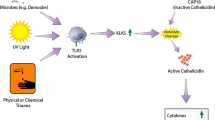Abstract
Rosacea is a chronic condition associated with relapses. Unsuccessful treatment is predicated, in part, on suboptimal adherence with the medication regimen. Motivating long-term compliance remains a challenge. The literature on adherence with rosacea medication is scant, but data from other diseases suggest that a multifactorial approach combining nonpharmacologic and adherence-enhancing pharmacologic interventions appears to offer the greatest success. The variety of topical metronidazole formulations that are relatively well tolerated and convenient to administer has been a notable advance in rosacea management. The dermatologist, by emphasizing the importance of adherence with therapy, can do much to facilitate this most critical behavior.
Similar content being viewed by others
References
Meichenbaum D, Turk DC.Facilitating Treatment Adherence: A Practitioner’s Guidebook. New York, NY: Plenum Press; 1987:11–68.
Haynes RB, McKibbin KA, Kanani R. Systematic review of randomised trials of interventions to assist patients to follow prescriptions for medications.Lancet. 1996;348:383–386.
DiMatteo MR, Sherbourne CD, Hays RD, et al. Physicians’ characteristics influence patients’ adherence to medical treatment: results from the Medical Outcomes Study.Health Psychol. 1993;12:93–102.
Data on file. Galderma Laboratories LP, Fort Worth, Texas, USA.
Knight AG, Vickers CFH. A follow-up of tetracycline-treated rosacea.Br J Dermatol. 1975;93: 577–580.
Roter DL, Hall JA, Merisca R, Nordstrom B, Cretin D, Svarstad B. Effectiveness of interventions to improve patient compliance: a meta-analysis.Med Care. 1998;36:1138–1161.
Eisen SA, Miller DK, Woodward RS, Spitznagel E, Przybeck TR. The effect of prescribed daily dose frequency on patient medication compliance.Arch Intern Med. 1990;150:1881–1884.
Cramer JA, Mattson RH, Prevey ML, Scheyer RD, Ouellette VL. How often is medication taken as prescribed? A novel assessment technique.JAMA. 1989;261:3273–3277.
Urquhart J. Controlled drug delivery: therapeutic and pharmacological aspects.J Intern Med. 2000;248:357–376.
Flanders PA, McNamara JR. Enhancing acne medication compliance: a comparison of strategies.Behav Res Ther. 1985;23:225–227.
Katsambas AD. Why and when the treatment of acne fails: what to do.Dermatology. 1998;196: 158–161.
Draelos ZK. Patient compliance: enhancing clinician abilities and strategies.J Am Acad Dermatol. 1995;32(suppl, pt 3):S42-S48.
Shear NH, Levine C. Needs survey of Canadian rosacea patients.J Cutan Med Surg. 1999;3: 178–181.
Cline RJ. Interpersonal communication skills for enhancing physician-patient relationships.Md State Med J. 1983;32:272–278.
Roter D, Frankel R. Quantitative and qualitative approaches to the evaluation of the medical dialogue.Soc Sci Med. 1992;34:1097–1103.
Thiboutot DM. Acne rosacea.Am Fam Physician. 1994;50:1691–1697.
Dahl MV, Katz HI, Krueger GG, et al. Topical metronidazole maintains remissions of rosacea.Arch Dermatol. 1998;134:679–683.
Bleicher PA, Charles JH, Sober AJ. Topical metronidazole therapy for rosacea.Arch Dermatol. 1987;123:609–614.
Aronson IK, Rumsfield JA, West DP, Alexander J, Fischer JH, Paloucek FP. Evaluation of topical metronidazole gel in acne rosacea.Drug Intell Clin Pharm. 1987;21:346–351.
Breneman DL, Stewart D, Hevia O, Hino PD, Drake LA. A double-blind, multicenter clinical trial comparing efficacy of once-daily metronidazole 1 percent cream to vehicle in patients with rosacea.Cutis. 1998;61:44–47.
Dahl MV, Jarratt M, Kaplan D, Tuley MR, Baker MD. Once-daily topical metronidazole formulations effectively treat the papules and pustules of rosacea.J Am Acad Dermatol. 2001;45:723–730.
Author information
Authors and Affiliations
Rights and permissions
About this article
Cite this article
Wolf, J.E. Medication adherence: A key factor in effective management of rosacea. Adv Therapy 18, 272–281 (2001). https://doi.org/10.1007/BF02850197
Issue Date:
DOI: https://doi.org/10.1007/BF02850197




